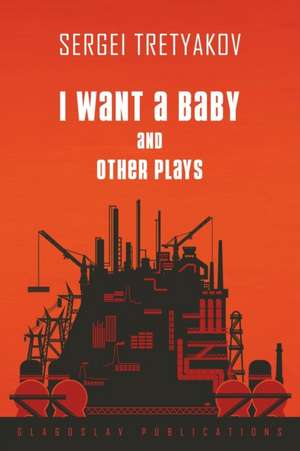I Want a Baby and Other Plays
Autor Sergei Tretyakoven Limba Engleză Paperback – 30 aug 2019
Tretyakov's plays are notable for their formal originality and their revolutionary content. The World Upside Down, which was staged by Vsevolod Meyerhold in 1923, concerns a failed agrarian revolution. A Wise Man, originally directed by the great film director and Tretyakov's friend, Sergei Eisenstein, is a clown show set in the Paris of the migr White Russians. Are You Listening, Moscow? and Gas Masks are 'agit-melodramas', fierce, fast-moving and edgy. And Roar, China dramatises an actual incident in the West's oppression of China, when a British gunboat captain threatened to blow the city of Wanxien to bits. Roar, China was translated into many languages and produced in cities across the world. The nerve this play touched may be gauged from the fact that it was staged in Yiddish translation in the Czestochowa concentration camp by Jewish prisoners during World War II.
These plays are not only stirring in their themes, they are also hugely significant in their construction. Tretyakov's early plays led directly to Eisenstein's highly influential theory of 'the montage of attractions', while later his ideas were crucial in the formation of Bertolt Brecht's theory of epic theatre. The reason why is evident in his plays, now collected and published for the first time.
Translated by Robert Leach and Stephen Holland
Introduction and translations of The World Upside Down,
A Wise Man, Are you Listening, Moscow? , Gas Masks
and I Want a Baby (second version): Robert Leach
Translations of Roar, China and I Want a Baby (first version): Stephen Holland
Publishers Maxim Hodak & Max Mendor
| Toate formatele și edițiile | Preț | Express |
|---|---|---|
| Paperback (1) | 171.76 lei 6-8 săpt. | |
| GLAGOSLAV PUBLICATIONS B.V. – 30 aug 2019 | 171.76 lei 6-8 săpt. | |
| Hardback (1) | 232.03 lei 6-8 săpt. | |
| GLAGOSLAV PUBLICATIONS B.V. – 30 noi 2019 | 232.03 lei 6-8 săpt. |
Preț: 171.76 lei
Nou
Puncte Express: 258
Preț estimativ în valută:
32.87€ • 34.19$ • 27.14£
32.87€ • 34.19$ • 27.14£
Carte tipărită la comandă
Livrare economică 14-28 aprilie
Preluare comenzi: 021 569.72.76
Specificații
ISBN-13: 9781912894307
ISBN-10: 1912894300
Pagini: 446
Dimensiuni: 152 x 229 x 26 mm
Greutate: 0.65 kg
Editura: GLAGOSLAV PUBLICATIONS B.V.
ISBN-10: 1912894300
Pagini: 446
Dimensiuni: 152 x 229 x 26 mm
Greutate: 0.65 kg
Editura: GLAGOSLAV PUBLICATIONS B.V.
Notă biografică
Sergei Tretyakov was a Russian poet, playwright, journalist and cultural worker. Born in Latvia in 1892, he first made his mark as a Futurist poet before World War I. After the 1917 Bolshevik revolution, Tretyakov found himself in the Far East of the country, fighting with the Red Partisans around Vladivostok. He only escaped by fleeing to China. He returned to Moscow in 1922, where he joined the editorial team of Vladimir Mayakovsky's LEF magazine. He also worked closely with the two most prominent revolutionary theatre directors, Vsevolod Meyerhold and Sergei Eisenstein. He created a series of sharp, agitational pieces for both these directors, but in 1924 he returned to China for eighteen months as Professor of Russian Literature at the University of Beijing. From this experience he created perhaps his two most popular works, the play Roar, China! and the 'bio-interview', Chinese Testament. Both these works found audiences and readers not only in Russia but very widely across the world. His next, and perhaps most important play, I Want a Baby, was banned by the censors despite Meyerhold's ardent support. He scripted films, and worked intensively in the 'Communist Lighthouse' kolkhoz (collective farm) at the time of the First Five Year Plan (1928-32). It was during this period that he developed his theory and practice of 'factography', a method whereby the writer not only reported the processes of real life, but by his art expressed the historical significance and potential of those processes. His international reputation grew steadily. He travelled to Germany, meeting many writers, artists and cultural figures, most notably Bertolt Brecht, with whom he became friendly and whose work he influenced decisively. Brecht even called Tretyakov 'my teacher'. But this internationalism was dangerous at a time when Stalin was attempting to impose 'socialism in one country' and was preparing to unleash what became 'the Great Terror'. Tretyakov was arrested in June 1937, accused of spying and sentenced to death. But he cheated the executioner's bullet by committing suicide in September of that year. Tretyakov was only rehabilitated in 1956 after Stalin's death. Gradually, some of his works were republished and a few of his plays produced. It seems however that the present book is the only complete collection of his plays ever to be published.
